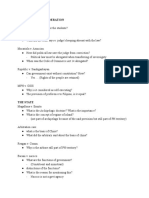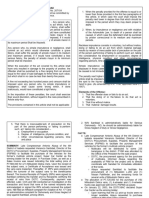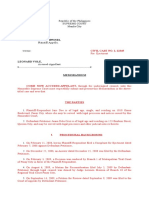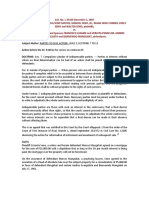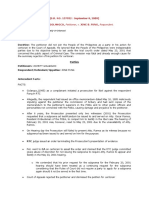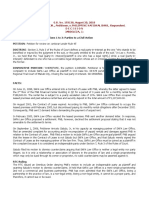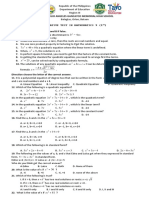Carino v. Insular Government
Carino v. Insular Government
Uploaded by
Erikha AranetaCopyright:
Available Formats
Carino v. Insular Government
Carino v. Insular Government
Uploaded by
Erikha AranetaOriginal Description:
Original Title
Copyright
Available Formats
Share this document
Did you find this document useful?
Is this content inappropriate?
Copyright:
Available Formats
Carino v. Insular Government
Carino v. Insular Government
Uploaded by
Erikha AranetaCopyright:
Available Formats
Mateo Cariño vs. Insular Government, 212 U.S 449, Law Ed.
, 594
Facts:
Mateo Cariñ o is an Igorot of the province of Benguet. For more than 50 years before
the Treaty of Paris, April 11, 1899, he and his grandfather had lived upon it, and had
maintained fences sufficient for the holding of cattle. His father had cultivated parts and had
used parts for pasturing cattle, and he had used it for pasture in his turn. They all had been
recognized as owners by the Igorot and he had inherited or received the land from his
father, in accordance with Igorot custom. He applied for the registration of a certain land.
There was no document of title issued for the land when he applied for registration. The
government contends that the land in question belonged to the state. Under the Spanish
Law, all lands belonged to the Spanish Crown except those with permit private titles.
Moreover, there is no prescription against the Crown.
In 1893 -1894 and 1896 -1897; he made an application but with no avail. In 1901,
the plaintiff filed a petition, alleging ownership, under the mortgage law, and the lands were
registered to him, that process, however, establishing only possessory title. Even if the
applicant have title, he cannot have it registered, because the Philippine Commission's Act
No. 926, of 1903, excepts the Province of Benguet among others from its operation
Issue:
A.) Whether the land in question belonged to the Spanish Crown under the Regalian
Doctrine.
B.) Whether Cariñ o has ownership and is entitled to registration.
Held:
A.) No. Law and justice require that the applicant should be granted title to his land. The
United States Supreme Court, through Justice Holmes declared:
“It might perhaps, be proper and sufficient to say that when, as far as testimony or
memory goes, the land has been held by individuals under a claim of private
ownership, it will be presumed to have been held in the same way from before the
Spanish conquest, and never to have been public land.”
There is an existence of native title to land, or ownership of land by Filipinos by
virtue of possession under a claim of ownership since time immemorial and
independent of any grant from the Spanish Crown, as an exception to the theory
of (jura regalia) Regalian Doctrine.
B.) YES. Petition Granted.
a. Land was not registered, and therefore became, if it was not always, public land.
b. Spanish Law: "Where such possessors shall not be able to produce title deeds, it
shall be sufficient if they shall show that ancient possession, as a valid title by
prescription." For cultivated land, 20 years, uninterrupted, is enough, for
uncultivated, 30 years.
c. Every native who had not a paper title is not a trespasser.
d. Applicant's possession was not unlawful, and no attempt at any such
proceedings against him or his father ever was made.
There must be a presumption against the government when a private individual claims
property as his or her own. It went so far as to say that the lands will be deemed private
absent contrary proof.
You might also like
- Antigone Presented by The Girls of ST Catherines by Madhuri ShekarDocument91 pagesAntigone Presented by The Girls of ST Catherines by Madhuri ShekarGabe Girson100% (6)
- Case Digest: Mateo Cariño vs. Insular Government, 212 U.S 449, Law Ed., 594Document2 pagesCase Digest: Mateo Cariño vs. Insular Government, 212 U.S 449, Law Ed., 594BarrrMaiden91% (11)
- Working A Democratic Constitution - A History of The Indian Experience PDFDocument401 pagesWorking A Democratic Constitution - A History of The Indian Experience PDFRaj Chouhan50% (2)
- B.M. No. 1154 (Resolution) - in Re Haron S. Meling PDFDocument3 pagesB.M. No. 1154 (Resolution) - in Re Haron S. Meling PDFEffy SantosNo ratings yet
- RBG RECIT QUESTIONSDocument4 pagesRBG RECIT QUESTIONSGwyneth SantosNo ratings yet
- (Table) Property RelationsDocument3 pages(Table) Property RelationsseanNo ratings yet
- Poe (Elamparo) - Resolution-Spa No. 15-001 (DC)Document35 pagesPoe (Elamparo) - Resolution-Spa No. 15-001 (DC)Ma Janelli Erika AguinaldoNo ratings yet
- Carino Vs Insular GovtDocument2 pagesCarino Vs Insular GovtRobelle RizonNo ratings yet
- MATEO CARIÑO vs. THE INSULAR GOVERNMENTDocument1 pageMATEO CARIÑO vs. THE INSULAR GOVERNMENTTin CaddauanNo ratings yet
- Carino vs. Insular GovernmentDocument3 pagesCarino vs. Insular GovernmentRyan Cruz IINo ratings yet
- Miners Association of The Philippines, Inc. vs. Factoran, JR., 240 SCRA 100Document10 pagesMiners Association of The Philippines, Inc. vs. Factoran, JR., 240 SCRA 100Michelle CatadmanNo ratings yet
- Case No. 83 Lapuz vs. Eufemio G.R. No. L-30977 January 31, 1972 FactsDocument1 pageCase No. 83 Lapuz vs. Eufemio G.R. No. L-30977 January 31, 1972 FactsLalaNo ratings yet
- Trillanes vs. MedialdeaDocument4 pagesTrillanes vs. MedialdeaMiguel ManuelNo ratings yet
- Ong vs. HretDocument3 pagesOng vs. HretLex AcadsNo ratings yet
- Landmark Cases On Civil LawDocument40 pagesLandmark Cases On Civil LawZayd ZaynNo ratings yet
- Oposa Et Al. Vs Factoran, Jr. Et Al. G.R. No. 101083july 30, 1993Document1 pageOposa Et Al. Vs Factoran, Jr. Et Al. G.R. No. 101083july 30, 1993Angelo Galingan PoyonganNo ratings yet
- University of San Jose-Recoletos School of LawDocument1 pageUniversity of San Jose-Recoletos School of LawPring SumNo ratings yet
- People vs. Chua HiongDocument2 pagesPeople vs. Chua HiongAlfonso Miguel DimlaNo ratings yet
- BAA of Zamboanga Vs Samar MiningDocument4 pagesBAA of Zamboanga Vs Samar MiningRio PortoNo ratings yet
- Monasco V CA - DigestDocument1 pageMonasco V CA - DigestKL MuñozNo ratings yet
- Kirvenko V Registry of DeedsDocument3 pagesKirvenko V Registry of DeedsJun MagdaraogNo ratings yet
- Digest AccidentDocument5 pagesDigest AccidentErica Mae VistaNo ratings yet
- RICHARD HIZON v. CADocument2 pagesRICHARD HIZON v. CACandelaria QuezonNo ratings yet
- Natres Sat HW DigestsDocument1 pageNatres Sat HW DigestsAnonymous rVdy7u5No ratings yet
- Krivenco V Register of DeedsDocument1 pageKrivenco V Register of DeedsGillian CalpitoNo ratings yet
- Application For Clep GumawidDocument3 pagesApplication For Clep GumawidDianne Medel GumawidNo ratings yet
- (CRIM2) Ombudsman v. SantidadDocument6 pages(CRIM2) Ombudsman v. SantidadhannahlouiseleeNo ratings yet
- Republic Act 8552 Domestic Adoption Act of 1998Document9 pagesRepublic Act 8552 Domestic Adoption Act of 1998AD100% (1)
- Gudani Vs SengaDocument3 pagesGudani Vs SengaJL A H-DimaculanganNo ratings yet
- Astorga V VillegasDocument1 pageAstorga V VillegasM GeminiNo ratings yet
- Position Memorandum Witness For The ProsecutionDocument5 pagesPosition Memorandum Witness For The ProsecutionJamieNo ratings yet
- 2019 LTD Case DigestsDocument2 pages2019 LTD Case DigestsCarleen BongatNo ratings yet
- Homestead PatentDocument2 pagesHomestead PatentMC NPNo ratings yet
- Revised Penal Code Memorize ProvisionDocument4 pagesRevised Penal Code Memorize ProvisionSweet Karrah Salazar-CorveraNo ratings yet
- Alcantara Vs DENR DigestDocument2 pagesAlcantara Vs DENR DigestTJ MerinNo ratings yet
- Supreme Court Decision Hacienda LuisitaDocument57 pagesSupreme Court Decision Hacienda LuisitaDavid Michael San JuanNo ratings yet
- RA 386 Self-Help DoctrineDocument1 pageRA 386 Self-Help DoctrineBab Ly100% (1)
- Heirs of Amunategui Vs Director of Forestry FactsDocument1 pageHeirs of Amunategui Vs Director of Forestry FactsPatricia BautistaNo ratings yet
- Property 13th Week ExtraDocument13 pagesProperty 13th Week ExtrajoyceNo ratings yet
- Filipino First Policy EnshrinedDocument24 pagesFilipino First Policy EnshrinedJANNNo ratings yet
- Republic Vs Sereno GR No. 237428 May 11, 2018Document17 pagesRepublic Vs Sereno GR No. 237428 May 11, 2018Jacquelyn RamosNo ratings yet
- Ocampo vs. EnriquezDocument1 pageOcampo vs. Enriquezjovani emaNo ratings yet
- Cruz v. Flavier (G.R. No. 135385)Document1 pageCruz v. Flavier (G.R. No. 135385)JP Murao IIINo ratings yet
- Gonzales v. PennisiDocument1 pageGonzales v. PennisiRon Decin100% (1)
- PERSONS AND FAMILY RELATIONS 2024 ReviewerDocument11 pagesPERSONS AND FAMILY RELATIONS 2024 ReviewerPrincess ZoletaNo ratings yet
- MUSTANG LUMBER v. CADocument2 pagesMUSTANG LUMBER v. CACandelaria QuezonNo ratings yet
- 15 Republic Vs Spouses RegultoDocument1 page15 Republic Vs Spouses RegultoLara CacalNo ratings yet
- People v. Escober, 157 SCRA 541 (1988)Document39 pagesPeople v. Escober, 157 SCRA 541 (1988)Edryd RodriguezNo ratings yet
- 7 CaseDocument53 pages7 CaseHennessy VasquezNo ratings yet
- Digested Cases For Stat ConDocument3 pagesDigested Cases For Stat ConJenifer PaglinawanNo ratings yet
- IPRA RosalesDocument3 pagesIPRA RosalesMary.Rose RosalesNo ratings yet
- IN RE - Letter of Reynato Puno - DigestDocument8 pagesIN RE - Letter of Reynato Puno - DigestMary Fatima BerongoyNo ratings yet
- Spouses Roberto & Natividad Valderama v. Salvacion Macalde - GR 165005 Sept. 16, 2005Document19 pagesSpouses Roberto & Natividad Valderama v. Salvacion Macalde - GR 165005 Sept. 16, 2005Lawrence EsioNo ratings yet
- Digest - Land Titles (Noval, IAC and Rovancy)Document5 pagesDigest - Land Titles (Noval, IAC and Rovancy)Alvin Niño100% (1)
- Gonzales vs. AbayaDocument3 pagesGonzales vs. AbayadoraemonNo ratings yet
- 01 Lee V Director of LandsDocument12 pages01 Lee V Director of LandsyousirneighmNo ratings yet
- Alviola V CADocument2 pagesAlviola V CAbatusay575No ratings yet
- PDF Ichong Vs Hernandez 101 Phil 115Document11 pagesPDF Ichong Vs Hernandez 101 Phil 115Sandra DomingoNo ratings yet
- Tolentino Vs Secretary of Finance 1994Document4 pagesTolentino Vs Secretary of Finance 1994Carlota Nicolas VillaromanNo ratings yet
- Po Yo Bi Vs RepublicDocument20 pagesPo Yo Bi Vs RepublicAtheena Marie PalomariaNo ratings yet
- Carino vs. Insular Government 1909Document2 pagesCarino vs. Insular Government 1909Charlyn SabioNo ratings yet
- Cariño Vs Insular GovernmentDocument1 pageCariño Vs Insular Governmentmichelle_calzada_1No ratings yet
- Deed of Absolute Sale - LamborghiniDocument2 pagesDeed of Absolute Sale - LamborghiniErikha AranetaNo ratings yet
- ACKNOWLEDGMENT and JURATDocument2 pagesACKNOWLEDGMENT and JURATErikha AranetaNo ratings yet
- Laguna Lake Development Authority VDocument2 pagesLaguna Lake Development Authority VErikha AranetaNo ratings yet
- Spouses Azucena B Corpuz v. CitibankDocument3 pagesSpouses Azucena B Corpuz v. CitibankErikha AranetaNo ratings yet
- Roberto G. Alarcon, Petitioner, V. The Court of Appeals and Bienvenido JUANI, Respondents. Kapunan, JDocument2 pagesRoberto G. Alarcon, Petitioner, V. The Court of Appeals and Bienvenido JUANI, Respondents. Kapunan, JErikha AranetaNo ratings yet
- Facts:: Tano V Socrates GR No. 110249 August 21, 1997Document2 pagesFacts:: Tano V Socrates GR No. 110249 August 21, 1997Erikha AranetaNo ratings yet
- Affidavit of LostDocument4 pagesAffidavit of LostErikha AranetaNo ratings yet
- Cruz Vs Secretary of DENRDocument2 pagesCruz Vs Secretary of DENRErikha AranetaNo ratings yet
- Afp v. CaDocument3 pagesAfp v. CaErikha AranetaNo ratings yet
- PHILIPPINE SAVINGS BANK, Petitioner, v. JOSEPHINE L. PAPADocument3 pagesPHILIPPINE SAVINGS BANK, Petitioner, v. JOSEPHINE L. PAPAErikha AranetaNo ratings yet
- Ong v. TatingDocument5 pagesOng v. TatingErikha AranetaNo ratings yet
- Carpio v. CaDocument4 pagesCarpio v. CaErikha AranetaNo ratings yet
- G.R. No. 165697 August 4, 2009 ANTONIO NAVARRO, PetitionerDocument4 pagesG.R. No. 165697 August 4, 2009 ANTONIO NAVARRO, PetitionerErikha AranetaNo ratings yet
- Seno v. MangubatDocument5 pagesSeno v. MangubatErikha AranetaNo ratings yet
- Spouses Fernandez v. SmartDocument4 pagesSpouses Fernandez v. SmartErikha AranetaNo ratings yet
- ROBERTO G. ALARCON, Petitioner, v. THE COURT OF APPEALS and BIENVENIDO JUANIDocument3 pagesROBERTO G. ALARCON, Petitioner, v. THE COURT OF APPEALS and BIENVENIDO JUANIErikha AranetaNo ratings yet
- V-GENT, INC., Petitioner, v. MORNING STAR TRAVEL AND TOURS, INC., RespondentDocument3 pagesV-GENT, INC., Petitioner, v. MORNING STAR TRAVEL AND TOURS, INC., RespondentErikha AranetaNo ratings yet
- Fortune Corp v. CaDocument2 pagesFortune Corp v. CaErikha AranetaNo ratings yet
- Ordonez CaseDocument3 pagesOrdonez CaseErikha AranetaNo ratings yet
- Petitioners, VS.: RespondentsDocument2 pagesPetitioners, VS.: RespondentsErikha AranetaNo ratings yet
- RULE 10 CASES - Sps. Dionisio v. Linsangan and Ada V. BaylonDocument4 pagesRULE 10 CASES - Sps. Dionisio v. Linsangan and Ada V. BaylonErikha AranetaNo ratings yet
- DEPARTMENT OF HEALTH, THE SECRETARY OF HEALTH, and MA. MARGARITA M. GALON, Petitioners, v. PHIL PHARMA WEALTH, INC., RespondentDocument3 pagesDEPARTMENT OF HEALTH, THE SECRETARY OF HEALTH, and MA. MARGARITA M. GALON, Petitioners, v. PHIL PHARMA WEALTH, INC., RespondentErikha AranetaNo ratings yet
- CITIBANK, N.A., Petitioner, v. SPOUSES AZUCENA B. CORPUZ AND RENATO S. CORPUZDocument3 pagesCITIBANK, N.A., Petitioner, v. SPOUSES AZUCENA B. CORPUZ AND RENATO S. CORPUZErikha AranetaNo ratings yet
- (G.R. NO. 157952: September 8, 2009) Jowett K. Golangco,: Petitioner, v. JONE B. FUNG, RespondentDocument2 pages(G.R. NO. 157952: September 8, 2009) Jowett K. Golangco,: Petitioner, v. JONE B. FUNG, RespondentErikha Araneta100% (1)
- BOOKLIGHT, INC., PETITIONER, v. RUDY O. TIU, RESPONDENTDocument2 pagesBOOKLIGHT, INC., PETITIONER, v. RUDY O. TIU, RESPONDENTErikha AranetaNo ratings yet
- Saludo v. PNBDocument2 pagesSaludo v. PNBErikha Araneta67% (3)
- CITY OF DAGUPAN, REPRESENTED BY THE CITY MAYOR BENJAMIN S. LIM, Petitioner, v. ESTER F. MARAMBA, REPRESENTED BY HER ATTORNEY-IN-FACT JOHNNY FERRERDocument5 pagesCITY OF DAGUPAN, REPRESENTED BY THE CITY MAYOR BENJAMIN S. LIM, Petitioner, v. ESTER F. MARAMBA, REPRESENTED BY HER ATTORNEY-IN-FACT JOHNNY FERRERErikha AranetaNo ratings yet
- INDIANA AEROSPACE UNIVERSITY, Petitioner, vs. COMMISSION ON HIGHER EDUCATION (CHEDDocument3 pagesINDIANA AEROSPACE UNIVERSITY, Petitioner, vs. COMMISSION ON HIGHER EDUCATION (CHEDErikha AranetaNo ratings yet
- Demetriou v. CaDocument2 pagesDemetriou v. CaErikha AranetaNo ratings yet
- Third Division G.R. No. 214593, July 17, 2019 Dana S. Santos, Petitioner, V. Leodegario R. Santos, Respondent. Decision The FactsDocument12 pagesThird Division G.R. No. 214593, July 17, 2019 Dana S. Santos, Petitioner, V. Leodegario R. Santos, Respondent. Decision The FactsErikha AranetaNo ratings yet
- Insight2e PL UppInt Gram Ref PracticeDocument6 pagesInsight2e PL UppInt Gram Ref PracticeJustyna BuczekNo ratings yet
- Class 5 - IMO 2017Document7 pagesClass 5 - IMO 2017Champak100% (3)
- The Great Indian GoddessDocument32 pagesThe Great Indian GoddessShantanu TilakNo ratings yet
- Case Study Set CDocument2 pagesCase Study Set CMayankNo ratings yet
- Sika PDS E Plastomix - 250Document2 pagesSika PDS E Plastomix - 250lwin_oo2435No ratings yet
- Patronage Motives: Patronage Motives May Be Defined As Consideration or Impulses Emotional Patronage Motives: Emotional Patronage Motives Those ThatDocument3 pagesPatronage Motives: Patronage Motives May Be Defined As Consideration or Impulses Emotional Patronage Motives: Emotional Patronage Motives Those ThatThe State AcademyNo ratings yet
- Social Groups: (Primary, Secondary and Tertiary)Document6 pagesSocial Groups: (Primary, Secondary and Tertiary)Devesh KumarNo ratings yet
- Types of LiteratureDocument19 pagesTypes of LiteratureScoobminiNo ratings yet
- Low-PAPR Hybrid Filter For SC-FDMADocument4 pagesLow-PAPR Hybrid Filter For SC-FDMARoopali AgarwalNo ratings yet
- Miracle Cure Organic Germanium Asai KazuhikoDocument184 pagesMiracle Cure Organic Germanium Asai Kazuhikosou.pedro33No ratings yet
- Giao An Tieng Anh 3 Bai 1 Tiet 1Document2 pagesGiao An Tieng Anh 3 Bai 1 Tiet 1TuấnNo ratings yet
- Sidebar ExerciseDocument34 pagesSidebar ExerciseSergioNo ratings yet
- Litonjua Shipping Co. v. NSBDocument3 pagesLitonjua Shipping Co. v. NSBBeatrice AbanNo ratings yet
- Sampling Concepts, Sampling Distributions & EstimationDocument21 pagesSampling Concepts, Sampling Distributions & EstimationAnika KumarNo ratings yet
- Chapter 7 The Balanced Scorecard A Tool To Implement Strategy SoftDocument20 pagesChapter 7 The Balanced Scorecard A Tool To Implement Strategy SoftDjunah ArellanoNo ratings yet
- Komodo Dragon Is A Member of The Monitor FamilyDocument3 pagesKomodo Dragon Is A Member of The Monitor FamilyYuri Ga GarinNo ratings yet
- Insurance - de La Fuente vs. Fortune Life Insurance Co., Inc., G.R. No. 224863, December 2, 2020Document2 pagesInsurance - de La Fuente vs. Fortune Life Insurance Co., Inc., G.R. No. 224863, December 2, 2020rei0% (1)
- AnswerDocument4 pagesAnswerJebb CaneNo ratings yet
- British Royal FamilyDocument27 pagesBritish Royal FamilyАнастасія СлободяникNo ratings yet
- Dasakam 11-20Document14 pagesDasakam 11-20Puducode Rama Iyer RamachanderNo ratings yet
- 1st Periodic Test Math 9Document3 pages1st Periodic Test Math 9Rexie Rodriguez MaanNo ratings yet
- Merchant of Venice Act 1 Scene 3Document13 pagesMerchant of Venice Act 1 Scene 3tanmy33100% (1)
- Department of Chemistry IIT Madras CY1001 Trimester 3 Assignment 1 For Lectures by K. Mangala SunderDocument7 pagesDepartment of Chemistry IIT Madras CY1001 Trimester 3 Assignment 1 For Lectures by K. Mangala SunderIron BusterNo ratings yet
- 348-CV Cdo Sun 2022Document2 pages348-CV Cdo Sun 2022Muhamad Saefrudin IINo ratings yet
- Learning Kit PR 2 Q2 Week 1Document8 pagesLearning Kit PR 2 Q2 Week 1Asahi HamadaNo ratings yet
- Principles of Speech WritingDocument15 pagesPrinciples of Speech WritingJessica Joy OpeñaNo ratings yet
- Academic Calendar 2011-12Document2 pagesAcademic Calendar 2011-12Anas IssaNo ratings yet
- Plato AssignmentDocument9 pagesPlato AssignmentDivyanshi SinghNo ratings yet




